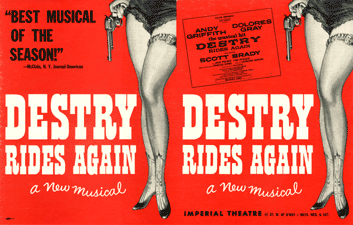Remembering Destry Rides Again
The musical western isn’t exactly a commonplace subgenre of the Broadway musical. Only a handful of westerns have been crafted for the musical stage, with varying results. The best known is of course Oklahoma!, followed by Paint Your Wagon. Other than that, the only other Broadway musical western that enjoyed a healthy run was the 1959 also-ran Destry Rides Again. Based on the 1939 classic film of the same name, Destry Rides Again ran in a season that featured more celebrated titles such as The Sound of Music, Gypsy, and Fiorello!, and it’s charms were lost in that shuffle. Still, it managed a run of 472 performances, which in 1959 was a respectable (if not impressive) stay on the Great White Way.
As a film, Destry Rides Again was everything moviegoing audiences could ask for in a western story. The small town of Bottleneck is under the oppressive thumb of an unscrupulous fellow named Kent who uses rigged card games to gain control of the town. The sheriff tries to step in, but is killed for confronting the con-man. The town drunk is appointed the new sheriff, who summons an old friend and lawman Tom Destry for help. Destry sends his son, Tom Destry, Jr., in his stead to restore law and order to Bottleneck. Kent also owns the local saloon, where the spunky showgirl “Frenchy” serves as both his girlfriend and his partner in crime. Frenchy, however, takes a shine to Destry, and does what she can behind the scenes to help him in his quest to save Bottleneck from corruption. The film starred Jimmy Stewart and Marlene Dietrich.
For the Broadway production of Destry Rides Again, the two leads were to be played by Andy Griffith and Dolores Gray. The plot of the musical, in the hands of book writer Leonard Gershe, would remain relatively faithful to the screenplay. The musical’s score would be written by Harold Rome, who had created such hits as Wish You Were Here and Fanny. The stage production would be directed and choreographed by Michael Kidd. Kidd, who predominantly worked as a choreographer and who was known for his athletic, high-steppin’ choreography on such stage shows as Finian’s Rainbow, Guys and Dolls, Can-Can and Li’l Abner, and the film Seven Brides for Seven Brothers, seemed like the ideal person to stage a musical with set in the Wild West. Indeed, his efforts served the show well, as he took home the Destry’s sole Tony Award (Best Choreography).
Harold Rome proved quite at home writing a score that captured the time, place and characters of a western film brought to the Broadway stage. The raucous opening “Bottleneck” set the tone, introduced the town folk, and helped us to understand we were visiting a lawless place full of corruption. “Hoop-de-Dingle,” “I Know Your Kind,” “Anyone Would Love You,” and “Only Time Will Tell” were standouts in a score that universally supported the piece as a musical (some people think westerns don’t make very good musicals).
Destry Rides Again opened a Broadway’s Imperial Theatre on April 23, 1959 where it lasted for just under a year, closing on June 18, 1960. Revivals of the show are rare. Are audiences just not interested in seeing musicals based on westerns? Did the original production pale in comparison to the beloved film? Most likely, yes. Is Destry Rides Again just a mediocre also-ran that deserves to fade into obscurity or would a revival reveal more to this show than it demonstrated the first time around? Rome’s score in particular makes a solid case that the show should not be forgotten, but a revival would most likely prove a foolhardy endeavor.
Mark Robinson is the author of the two-volume encyclopedia The World of Musicals, The Disney Song Encyclopedia, and The Encyclopedia of Television Theme Songs. His forthcoming book, Sitcommentary: The Television Comedies That Changed America,will hit the shelves in October, 2019. Hemaintains a theater and entertainment blog at markrobinsonwrites.com.






























